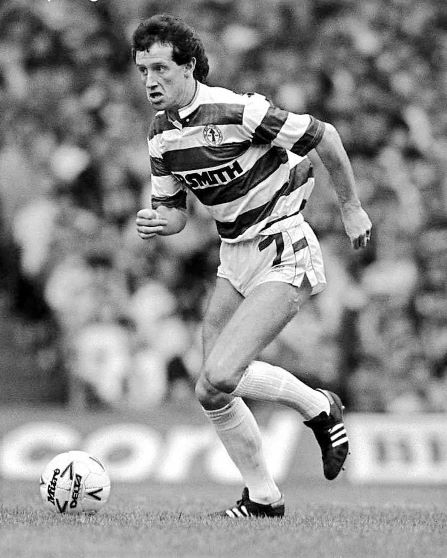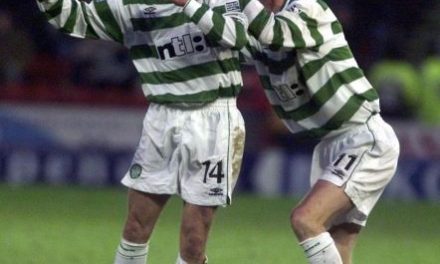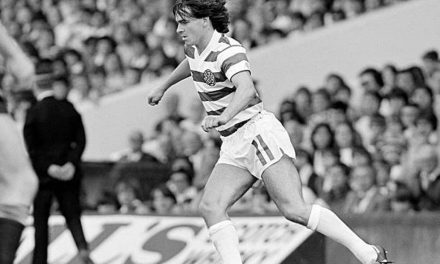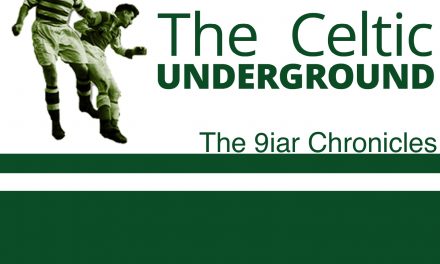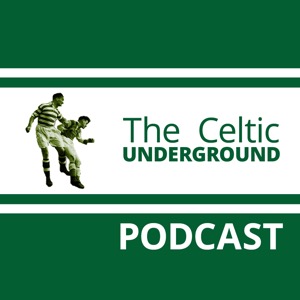In this latest interview St Anthony talks with Billy Stark about his rich and varied footballing career. Billy signed for Celtic in 1987 and played a huge part in the double winning centenary side of 1987-88. He later came back as assistant manager to Tommy Burns in 1994 and had 3 seasons in that role.
What was the first football match you attended and who was your first football hero?
The first game I was taken to I can remember very vividly and it was at Firhill between Partick Thistle and Kilmarnock. In those days Thistle had the red and yellow bands and Kilmarnock were in their blue and white stripes. It was a big, big thing to me as I was only a wee boy. I think my Dad wanted to take me to a neutral sort of game in common with a lot of west of Scotland families. My mum was Catholic and my Dad was a Protestant and his leaning was towards Rangers but he wanted me to see a neutral game. I can remember the splash of colour although from there, there wasn’t a favourite from those teams. My favourite Celtic player was Bobby Lennox from a very early age and from the other side it was Jim Baxter. This was mid 1960’s and wee ‘Lemon’ was always my favourite player. The thing that was fantastic was, whenever I got to meet him, and over the years I got to know him well, a better guy I’ve never met in football. You always get him the same way and he loves a joke and yet was so humble given all he had achieved.
How did you start off at St Mirren?
There was a wee guy called ‘Balldy’ Lindsay, who it turned out was Joe Miller’s uncle. He was a scout for St Mirren in 1975 after Alex Ferguson had taken over at Saints who had finished 6th in the old second division, which got them a place in the new first division. I was playing with Anniesland Waverley at Juvenile level and I had trained with a few clubs. I trained with Rangers and Dumbarton and wee Balldy was always on my case, for some reason he really fancied me as a player, and he was turning up at my door regularly. Eventually Anniesland Waverley played St Mirren at Love Street and I did okay and I was invited to go to Saints’ first pre-season game which was at Selkirk and I had a poor first half and was average in the second half. However, Alex Ferguson signed me on the bus on the way home so he must have saw something there. I was just 18.
What was Fergie like in his young days as manager?
I saw him in his embryonic stage when he had been at East Stirling and he was barely a manager for a year at this point. He was fiery and volatile, in those early days at St Mirren he was just ready to take on the world. Apart from his ability, the drive and energy he had was unparalleled. He was always on the go and was so wrapped up in the game. I can’t remember a game when he was delighted with everything, there was always something that he was critical of. He was a perfectionist and that stood me in good stead as an individual.
Frank McGarvey and Tony Fitzpatrick were the main attractions in that Saints team as well as yourself and a guy called Bobby Reid. If fate had been different then he could have been another Alan Hansen.
As I recall Bobby did his cruciate in his knee in a Scotland select in the Highlands and never really recovered from it. In those days they didn’t have the technology to mend it. Bobby used to score 8 to 10 goals a season from centre half at set pieces. The word was Liverpool had him lined up then he got the injury and signed Hansen. McGarvey, Fitzpatrick, myself, Lex Richardson, Billy Abercromby, there was a young group of players there desperate to do well. In my first season there we finished 6th in the new first division and then in the second season we won the league.
The season you won the league, for people who are unaware this was the second tier, there was yourselves at St Mirren, Davie Cooper at Clydebank, Gordon Strachan at Dundee and Mark McGhee at Morton. There was some talent at that level.
They all went on to bigger things. We had a great rivalry that season with Clydebank. As you say Davie Cooper, Mike Larnach, and Jim Fallon. We actually played them on Christmas day 1976 at Kilbowie, there was 10,000 capacity, crowd trouble and it finished 2-2. It had everything. That season we went up as champions and Clydebank came up with us. We managed to stay there but Clydebank lost Cooper to Rangers and went down.
Saints established themselves in the Premier League and the first time you came to notice of Celtic fans was in October 1977 at Celtic Park.
Frank Munro signed for Celtic on the Friday and I scored my first Premier League goal that day. I was disappointed it took me so long as I always looked to get to double figures in a season so that was my first. In a funny way, jumping on a few years, I scored my 100th Premier League goal at that same Rangers end of Celtic Park many years later in 1988. For me as a young lad to score the winner at Celtic Park was amazing, I just guided it into the net. Frank Munro scored the own goal first and I scored the second. The other thing about that day, and I remember this clearly, was that Tommy Burns played left back that day with Celtic in green socks. Defensive work wasn’t his best thing.
At the end of that season with St Mirren consolidating their place in the division, it must have been a huge shock when Fergie left.
That season was tough, and he signed some experienced players like Jimmy Bone, Iain Munro and Jackie Copland. Those three, with the young lads we had, made the difference. We played Ayr around March and we beat them 1-0 with McGarvey scoring in the last minute and that distanced us from Ayr who ended up going down. Then we had the bombshell when Fergie left the club but you’re still young at that time and as much as it was a big impact you just have to get on with it. When you become more experienced you get more of a feeling for a manager and what he goes through but he was gone and that was it. Jim Clunie came in and did well, and the facts back him up, but you have to look at what Fergie did for us when we were in the old second division when he built the momentum that Jim Clunie benefited from. And making Ricky MacFarlane assistant when he had been physio for Fergie was a good move by Jim Clunie.
Jim Clunie made a couple of good signings.
He didn’t change that much but he bought Doug Somner and Frank McDougall as you say, and he had Peter weir breaking through and Billy Thomson. We had some memorable high scoring games with Celtic at that point, it seemed when we missed a chance they would go up the park and score, just that extra bit if quality. There was a 3-3, 5-2 and we lost 7-0 at Celtic Park too.
Do you remember the Celtic v St Mirren Scottish Cup ties in 1980?
Yes, McDougall scored for us and Murdo MacLeod scored a late equaliser for Celtic. In the replay at Love Street, it was a lock out that night, 27,000 and the game was held up. I think there was a couple of penalties before we lost 3-2 with Johnny Doyle scoring the winner. These were great, attacking games and wee Murdo always seemed to score with long range shots. Celtic had McGarvey, McCluskey and Nicholas at that time and we knew we were up against real quality. We held our own when Dougie Somner arrived and finished third in the league and won the Anglo Scottish cup as well. I’m as proud as that as anything because we beat some top division English sides along the way, Bolton Wanderers, Bristol City. Bolton had Frank Worthington and Willie Morgan and we played Fulham when they had George Best. That was a magnificent competition for us but not so good for Celtic and Rangers who lost to Burnley and Chesterfield.
McGarvey moved to Liverpool and Fitzpatrick moved to Bristol City, did you ever get the chance to move down south from Saint Mirren.
No, I don’t recall pushing for a move. I got married in 1979, started a family and I enjoyed it at St Mirren at that time. I was never one to push for a transfer although paper talk was that Rangers were interested in me. In 1983 I signed for Aberdeen as freedom of contract had now kicked in. The old way meant that if clubs offered you the same wage from the previous season then you couldn’t go anywhere. Then with freedom of contract you could leave and the transfer fee would be decided by a tribunal. By 1983 I had been at Love Street for 8 years and I made up my mind that I wanted to move on. Aberdeen came in for me and there can’t be many player Alex Ferguson has signed twice. At that time Rangers and Dundee United wanted to sign me as well. I got a phone call from Alex Ferguson, who was the English PFA awards in London, and someone had told him I had signed for Rangers, after I had agreed to sign for him, and he was raging. He then settled down when I assured him I wanted to go to Aberdeen. It wasn’t a very hard decision as Aberdeen had just won the Cup Winners Cup. Fergie said he signed me because he felt Aberdeen were not scoring enough goals from the middle of the park.
Aberdeen were at their peak. Did you play in the Super Cup final ties?
I was on the bench as I had been injured for a while but I got a medal. We beat Hamburg who were the European champions and the same season we played Porto in the semi-finals in 1984 and lost to them. They went on to win the European Cup in 1987, they were a right good side.
You won plenty of medals between 1983 and 1986 at Pittodrie.
It was fantastic. People tell you not to take it for granted but when you are so successful you think it will last forever. Looking back now, it was a combination of factors at Aberdeen. Alex Ferguson was the main thing but he inherited a good squad and then he bought well and brought through good young talent. It worked out for me as I wanted to win major medals.
Alex Ferguson moved on to Man United in 1986 and Ian Porterfield moved in at Pittodrie and a few months later you were off to Celtic.
In my first game for Celtic at Celtic Park we lost 5-1 to Arsenal! I was so lucky that Billy McNeill had moved back to replace Davie Hay and he was looking for new players as he had lost Murdo MacLeod, Brian McClair and Alan McInally. He knew me well from previous years and he was kind enough to say that he wished he had signed me earlier. Mick McCarthy had been Davie’s last signing and then Andy Walker, Chris Morris and myself came in and later on wee Joe Miller arrived with Frank McAvennie and that’s how that team came together. To go to Celtic in their centenary year is something I will always be amazed and grateful for.
Then there was the famous game against Rangers when you scored the winner.
Peter Grant was involved in the two main incidents, when I scored the goal and then when Souness was sent off. I remember the goal well, we’d worked on pressing the ball and Jimmy Nicholl had the ball at right back. Tommy Burns put him under pressure and Nicholl gave the ball away to Mark McGhee on the left who played it into the penalty area and Granty, for some reason, was at the edge of the penalty box. He dummied it, probably because he didn’t want to make a mess of it, and I came in at the back and I found the corner of the net with my left foot. At that point there was only five minutes gone and that was the winner although we missed some chances. That set a marker as everyone expected Rangers to win the league having signed a lot of experienced players from England like Butcher and Roberts.
Where you aggrieved at Souness’ tackle on you?
I remember doing a thing for Celtic TV and I had to pick my best opponents I had played against and I put Souness in there which surprised some people. Souness was a magnificent player but he was a nasty bit of work. That was part of his game but he was a superb player. I played a wee pass to Granty and my boot came off and he played it back to me and I saw Souness coming. I was experienced enough to see what was happening and he had been booked already, so I laid the ball off and got the weight off my foot and he just came right through me. If I had my weight on my foot he’d have done me no doubt. I just went down and of course big Roy was right in there. It was a no brainer for Davie Syme, it was a sending off on its own never mind a second booking. This all helped to get me a good start in my Celtic career.
There were two memorable goals you scored which stay in the memory, one at Easter Road in a Scottish Cup replay and the other at Pittodrie in a midweek game.
Against Hibs, Grant hit a great shot off the bar and as it came out I anticipated it and jumped to head it into the net. As a boy I had played as a striker so I always fancied myself at scoring goals. My Dad used to say if someone tries a shot then follow it in and it may come off the goalkeeper. It bounced high and when I saw it later I noticed the ball went in high too. The one at Pittodrie, I had already scored to get us back to 2-1 as we had been two down. That wasn’t like me as it was far out but I enjoyed that goal especially going back to Pittodrie.
Is there one particular memory from the centenary season that you hold dear?
In the cup final at Hampden I remember big Billy named the team and told us it was a 13 man job because Mark McGhee and I were on the bench and he knew how disappointed we were not to be starting. He brought us both on with 25 minutes to go when we were 1-0 down. It was a cracking sunny day and the green and white from the crowd was almost blinding. I won a corner at the Celtic end and I will never forget the roar from the Celtic fans which sent a shiver inside me. That support helps you to find something extra and that’s what sticks out for me that season was that the fans were just not going to accept defeat. That summed up the whole significance of it and Billy McNeill was always on at us as to how important it was. We had a lot of players who were very competitive, demonstrably so when you saw Roy Aitken in the cup final. Most teams would have settled for extra time when they equalise late on but big Roy was on at us saying, no way, we are going for the winner.
Celtic did not build on that centenary success.
You could gauge big Billy was disappointed that he wasn’t given the funds to go and build on it because it needed added to. In the end up, Ian Andrews was the only player we signed and they were forced into that when Pat Bonner was injured. You should strengthen when you are on top and we didn’t do that.
In 1990 you moved on to Kilmarnock. Was it Tommy Burns who signed you?
No, Tommy left in December 1989 after playing his last game against Ajax so he was at Kilmarnock mid-season. I had been injured and played the last few games including the cup final which we lost on penalties to Aberdeen. Jim Fleeting was the Killie manager and big Billy actually offered me another year’s contract, which was difficult to turn down, but I was 33 at that time and I knew I wanted to play as much as I could so I chose to go to Killie when Tommy was on the coaching staff.
You were a right sided midfielder and Tommy was left sided, so you must have had a few clashes over the years?
I had played against Tommy in my St Mirren and Aberdeen days and played with him at Celtic. He was such a great guy but he was an absolutely fierce competitor within that and you saw that in the management side as well. Tommy would kick you if he had too at times but here was always a laugh with it. We had a mutual respect. Playing against him then was hard because the Celtic front players, MacLeod, Provan, Burns, McCluskey, Nicholas, McGarvey were excellent, although they could leave themselves open defensively so my job was to try and get in the area. And when I was doing that, Tam would be standing waiting for us to lose it and I’d have to chase him back.
How did the managerial role come about?
There was a sort of agreement between me and Tommy. In 1985 I started doing my coaching badges at Largs and Tommy was there at the same time. We had the same ideas on how the game should be played. Then when I signed for Celtic we found that rapport was there and thought if we ever got a go in management then the two of us would work together. When he got the manager’s job I had actually gone to Hamilton to be assistant to Billy McLaren then at the end of that season Tommy asked me to be his assistant at Kilmarnock.
What kind of partnership were you?
When you become an assistant manager you bring with you the standards that you were brought up with. When you’re on the coaching staff your job, totally, is to support the manager in every respect. Sometimes you have a difference of opinion but at the end of the day Tommy had the final say as manager. Tam had the red hair and at times he lost his temper but generally he was very measured. In the technical side of the game he was fantastic and had clear views on how he wanted his teams to play and particularly how he wanted Celtic to play. We got promotion to the Premier League in 1993 by the skin of our teeth, then in the 12 team league of 1993-94, 3 teams were relegated that season to make a 10 team league. It was so tight at the bottom. We beat Rangers in the second last game 1-0 and Tommy wasn’t playing and I was playing sweeper at that time. Then we went to Easter Road for the final game and we took a big crowd through to Edinburgh. We just needed a draw but St Johnstone beat Motherwell 1-0 at Fir Park and we were drawing 0-0 so one goal for Hibs and we were down. That was a long 90 minutes but we held out and stayed up. We got called Dad’s Army because there was me, Tommy, George McCluskey, Bobby Williamson, and Craig Patterson. We only had £60,000 to spend and we bought Andy Millen from Hamilton who was a great signing. We actually tried to sign Andy for Celtic in 1994 but Alex Totten wouldn’t allow it.
In the summer of 1994 you and Tommy ended up back at Celtic.
I was on holiday and had come back to Glasgow airport and we were going down to sign an S Form, I think to was Garry Hay, and it came on the radio that Celtic had sacked Lou Macari. I must admit I thought, uh-ho, I wonder if they’ll want Tommy now? We were 37 when we went there which is very young. We had just signed new contracts but this was Celtic and Bob Fleeting did not take that well at all. What happens these days is agents contact players and managers and its accepted practice but back then when Celtic contacted us it was seen as controversial. Bob offered me the Kilmarnock manager’s job but I wanted to go with Tam. Then we got caught up in the politics and had to go through to the Scottish League and there was a lot of bad feeling. Later on that season we got to the Scottish Cup final in May and Tam and I went to tribunal at the Westerwood Hotel, that’s how long that ran on for.
What was your first impressions on the Celtic squad in 1994?
The squad needed improving but you still had Grant, Bonner and Paul McStay from my time there. Packie and Charlie had actually been freed by Macari at the end of that season and we brought them back. Nicholas was some player, he should have done so much more with the ability he had. There was Mark McNally, Rudi Vata, Willie Falconer and Simon Donnelly was breaking through. We then made signings, Pierre Van Hooydonk was a big one for us and Phil O’Donnell, we needed that type of attacking midfield player. We considered Alan McLaren but we needed Phil O’Donnell more. Fergus was on holiday when we signed Phil and wasn’t happy with how the deal was structured. We paid more up front as a first instalment than usual and Fergus wasn’t happy with that. We went to Holland many times before we signed Pierre. We hesitated a bit as he was 24-25 and we wondered why no one touched him as we got him for £1.2m which was a bargain. He scored the winner in the cup final and that gave us a bit of breathing space.
Where there any players who you missed out on?
The one I remember was in Rangers 9 in a row season. Fergus, as it is well known, did such a good job and the reason he was able to do that was that he was very detached from the football side. He had his focus building the new stadium and I don’t think he was as concerned as we were about Rangers doing 9 in a row. That season Paul McStay was having a lot of trouble with his ankle and ended up retiring. At the turn of the year we went down to the Belfry in England for some training. We were trying to sign Andy Townsend, who was the Republic of Ireland captain at that time, who was 31, for £650,000. However, Fergus wouldn’t release the money because of Andy’s age. We needed that type of player as Paul was struggling. I ended up taking the team down while Tommy stayed to fight with Fergus. Yet he gave us £3,500,000 to sign Alan Stubbs but sometimes it’s down to the timing of the payments. Alan was 24 and had a sell on value but he wouldn’t agree to Andy Townsend.
The foreign players made a big difference.
I remember when Di Canio made his debut at Kilmarnock. He had been injured and was on the bench. We were thinking we could maybe get away with not playing him that day to let the injury clear up. He totally changed the game when he came on that day. In training I had never seen anything like him, the ability, the confidence, the hunger, the desire. He was a genius. I just feel so sad that he didn’t stay at Celtic for 3 or 4 years.
Yet when we lost the semi to Falkirk in 1997 Paolo was a problem.
The season before we had a great shape to the team and Paolo upset that. You would never leave him out though. We brought him to Celtic to play wide right but he wanted the ball all the time and wandered around. That night against Falkirk people were forced into giving him the ball even when he had three man around him. He tried like a bear to win us the game but he did upset the shape of the side.
Do you think if you and Tommy stayed then he would have stayed?
I think he would have without a doubt. One day we were training at Barrowfield at 8 a side. Gordon Marshall had the ball and wouldn’t give him it and Paolo just threw a strop. He stormed off the pitch and walked along London Road back to Celtic Park. Tommy had to go up to his house that night with flowers for the wife. But he loved Tommy. I think he’d have stayed for another year at least.
And not getting Cadete in time was a blow. He was the difference between winning and losing the league.
Rangers had Gascgoigne and Laudrup and we needed someone to score goals to turn too many draws into wins. He missed the semi-final against Rangers as well when Jim Farry delayed the registration and Farry lost his job because of that. You can reflect on that now and see Cadete would have made a difference.
The biggest blow was the league defeat to Rangers in March just after beating them in the cup.
They scored the shittiest goal you will ever see in your life and it was the windiest day ever. It was a horrible day all round. Having beaten them well in the cup they brought Hateley as a sort of stunt but it worked for them. That was frustrating as we had opportunities that season to get in front of them and never took them.
Tommy lost his job in April 1997 and you became caretaker manager.
For 3 games and we were unbeaten! It was Hibs on the Sunday and I spoke to Tommy and he encouraged me to stay on and have a go at being full time manager but once Tommy was gone, I was gone. But I decided to take them to the end of the season just to see it through. After the last game against Dundee United then that was me.
What did you consider after Celtic?
The difficulty for me, and particularly for Tommy, was having been at Celtic then there is nothing in Scotland. I am married to a teacher and have two girls so their education was very important to me. I said to Tommy that summer, as I knew he was looking down south, that I wasn’t going to go and he respected that so I stayed in Scotland.
When Tommy had his illness did he confide in you?
Yes. I was at Queens Park at the time when he was in the Royal and I used to go up every lunchtime and it looked as if it was getting sorted. I remember speaking to him on the phone on the day his grand-daughter was born and he got the news it was back again which was heart-breaking and I find it difficult to talk about it.
One of the saddest memories of Tommy’s passing was your eulogy in St Mary’s which was shown on TV.
I don’t know how I did that. Tam had so many close pals but for Rosemary to ask me to do it there was no way I could refuse. I still don’t know how I did it and to this day I’ve never seen it. I appreciate people saying I did it well but I can’t recall.
You had a spell later on as Scotland under 21 manager. How did you find that compared to club football?
I enjoyed it bit it was frustrating. It is a generational thing the way the world evolved. We played football because there was nothing else to do. That’s why we no longer produce the number of good players we used to produce. It was a great opportunity and I got the chance to take the senior team for one game when Craig Levein was sacked. That was away to Luxembourg when Jordan Rhodes scored a couple of goals and we won 2-1. From my first group Steven Fletcher was a real top player. Stuart Armstrong was another. He was a cracking boy and had a great attitude. He became a real top player as Celtic discovered for a few seasons. He as my captain at the under 21’s and I was delighted to see him signing for Celtic.
Thanks for your efforts in the hoops Billy, it was a pleasure to watch you through the years.
It was my pleasure.

